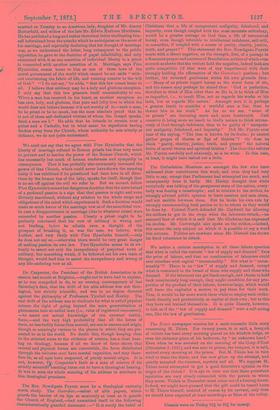'We need not say that we agree with Pere Hyacinthe
that the liberty of marriage refused to Roman priests has done very much to pervert and to harden the power of the Roman Church, which has necessarily lost much of human tenderness and sympathy in -consequence. That it has probably also enormously increased the power of that Church, which could never have shown the amazing unity it has exhibited if its priesthood had been torn in all direc- tions by the human ties of the laity, speaks for itself, though that is no set-off against the evil we refer to. But we cannot follow Pere Hyacinthe's somewhat dangerous doctrine that the mere inroad of a profound passion is a sign that that passion is right and even divinely sanctioned, without any relation to the whole scope and -obligations of the mind which experiences it. Such a doctrine would make as much havoc of the marriage vow as of the sacerdotal vow, in case a disappointment in marriage (due to whatever cause) were succeeded by another passion. Clearly a priest ought to be perfectly convinced that his vow of celibacy is wrong and not binding, before he admits even a thought of the prospect of breaking it, as was the case, we believe, with Luther, and very likely with Pere Hyacinthe himself,—only he does not say so,—otherwise there would be very great danger of making passion its own law. Pere Hyacinthe seems to us vir- tually to assert not only the inexpediency of perpetual vows of -celibacy, but something which, if he followed out his own train of thought, would lead him to assert the inexpediency and wrong of any life-enduring vow at all.


































 Previous page
Previous page